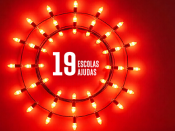Por Pedro Pinto (Universidade de Lisboa).
Abstract: The Proof Mining program makes use of functional interpretations in order to analyse non-effective mathematical proofs with the purpose of extracting new quantitative information. A result by Yao and Noor [7, theorem 3.3] that states the strong convergence of a generalized version of the Halpern type Proximal Point Algorithm was recently analysed. The original proof relies on a weak sequential compactness argument, a projection argument and makes use of arithmetical comprehension in a crucial way. I will comment on the elimination of these arguments in the quantitative version and focus on how it was possible to bypass the arithmetical comprehension needed in the original proof. The analysis presented uses the Bounded Functional Interpretation [2] instead of the more usual Kohlenbach's Functional Monotone Interpretation [4] and comes as a natural sequel of a paper by L. Leustean and P. Pinto [5].
This is joint work with B. Dinis and L. Leustean.
References:
[1] B. Dinis, L. Leustean and P. Pinto, Proof mining of the proximal point algorithm with multi-parameters (in preparation).
[2] F. Ferreira, P. Oliva, Bounded functional interpretation, Annals of Pure and Applied Logic, 135:73--112, 2005.
[3] F. Ferreira, L. Leustean and P. Pinto, On the removal of weak compactness arguments in proof mining (in preparation).
[4] U. Kohlenbach, Applied Proof Theory: Proof Interpretations and their Use in Mathematics, Springer Monographs in Mathematics. Springer-Verlag, Berlin, 2008.
[5] L. Leustean and P. Pinto, Quantitive results on Halpern type proximal point algorithms (in preparation).
[6] Wang and Cui, On the contraction-proximal point algorithms with multi-parameters, Journal of Global Optimization, 54(3):485--491, 2012.
[7] Yao and Noor, On convergence criteria of generalized proximal point algorithms, Journal of Computational and Applied Mathematics, 217(1):46--55, 2008.















